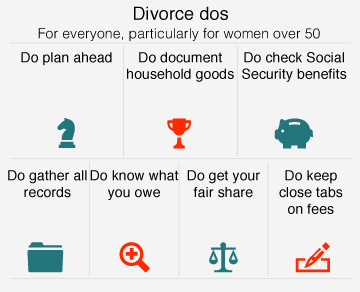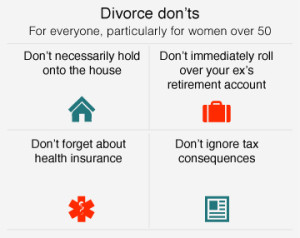Learn what to expect and how to cope with one of life’s most difficult events
By Sherry Amatenstein, LCSW (June 9, 2014) Reprinted with permission from Women’sDay.com
(All names and locations of women interviewed and quoted have been changed)
We all know and can imagine that divorce is difficult. But rarely do we get it told to us straight just how hard it really is. Should you trust your ex? Will your mother-in-law stop speaking to you? Are there any upsides? From experts as well as women who’ve been through it and survived, here are 10 things every woman should know.
- Don’t forget to grieve. Even if you initiate the divorce, you will experience sadness.A lot. Emma Johnson from New York City who has a radio show about being a single mother puts it this way. “Even if you know deep down the divorce is the best thing for all parties involved, it is still a loss—a lost love, lost relationship, lost dream that you had when you married and a lost vision for what you wanted your family to look like. My divorce rocked me to the marrow of my bones. If you deny yourself the opportunity to feel this pain, you will never fully heal.”
- You will outgrow your married friends. Divorce is so wrenching, it’s understandable why you will want every other relationship in your life to remain the same. But that’s not always possible or desirable. Chrystie Vahon from Portland, ME recalls, “I suddenly found myself distancing from my married friends and them doing the same. Being around them reminded me of my own failed relationship and being around me made them feel guilty for being happily married.” Spending time with other women who have been through the specific pain of divorce can be very healing.
- Your ex does NOT have your best interests at heart. No matter how much of a nice guy he is and how concerned he seems that you be taken care of, his main concern is himself. It is essential to get a sharp lawyer who is on your side. Tammy Olmes from Englishtown, NJ, cautions, “because I trusted my ex, I agreed to a mediator instead of getting a lawyer who would have insisted I get everything I was legally entitled to. Don’t think emotionally. You can always relent later, but if you’re too lenient in court you can never get back what you gave up.”
- Therapy is mandatory. This is a tumultuous time for you and it’s helpful to avail yourself of what can be gained by seeing a professional. KJ Greenwood from San Diego, CA, says, “Initially I bought into the stigma that therapy was for crazy people. But after finally seeking out a therapist, I’m a much better person than I would ever have been without.” Again, it’s important to gothrough the painful experience, not try and find ways around it.
- Avoid a serious relationship for at least two years. Yes, you’re afraid of loneliness but getting back into a relationship right away is just a distraction from the pain and self-evaluation that it is essential. Trina Wang from Poughkeepsie, NY, says regretfully, “The rebound thing is real. I was so afraid of being alone that I fell almost instantly in love. The bubble popped after six months and the man I was involved with got terribly hurt. I just wasn’t ready.”
- Your lawyer is not your marriage counselor. He or she may act like your best bud, but don’t forget that there is an hourly rate. This is a business arrangement. Need more convincing? Michael Stutman, President of the Academy of Matrimonial Lawyers, reveals, “Some high-end attorneys will intentionally draw out your case in order to increase the fee.”
- Cut all financial ties. It’s not enough just to close out the joint checking and savings account. Do a thorough investigation about what assets the two of you hold together. Julie Browne from Denver, CO, says, “Several years after my divorce, I had a delinquent timeshare payment pop up on my credit report, for the timeshare he had kept in the settlement.” Since her name was still listed, she started receiving collection calls and her credit took a hit.
- Suddenly you will have lots of free time.When you’re married with kids and jobs, the one thing you rarely have is a moment to yourself. That changes after divorce. Joan Hilton from Grand Rapids, MI, says, “Sharing custody with my ex was one of the biggest life-changers I’ve ever had. On the weeks my 15 and 10 year old are with their dad, I get to go to my book club, go dancing, work out and I’m starting a new business—it’s awesome.” Initially there was some guilt about not missing her kids enough but eventually she came to a great realization: “We don’t need to be together constantly to know we love each other.”
- You also divorce his family. When you marry someone, you marry his family. The opposite is true as well. Browne says, “When my ex-husband and I split, I kept in touch with his mom, who I’d become very close over 7 years of marriage. Two years after the divorce she suddenly stopped communicating with no explanation. That was harder than losing my ex.”
- You will eventually feel better. It probably feels like the torment and fighting and crying will never end. But there is light at the end of the tunnel. Christina Pesoli from Austin, TX, and author of the upcomingEmotional Hardbody says, “Getting through the first round of significant holidays, and the first summer when my children were gone for significant chunks of time, was really brutal. But after that things really do get easier.”


